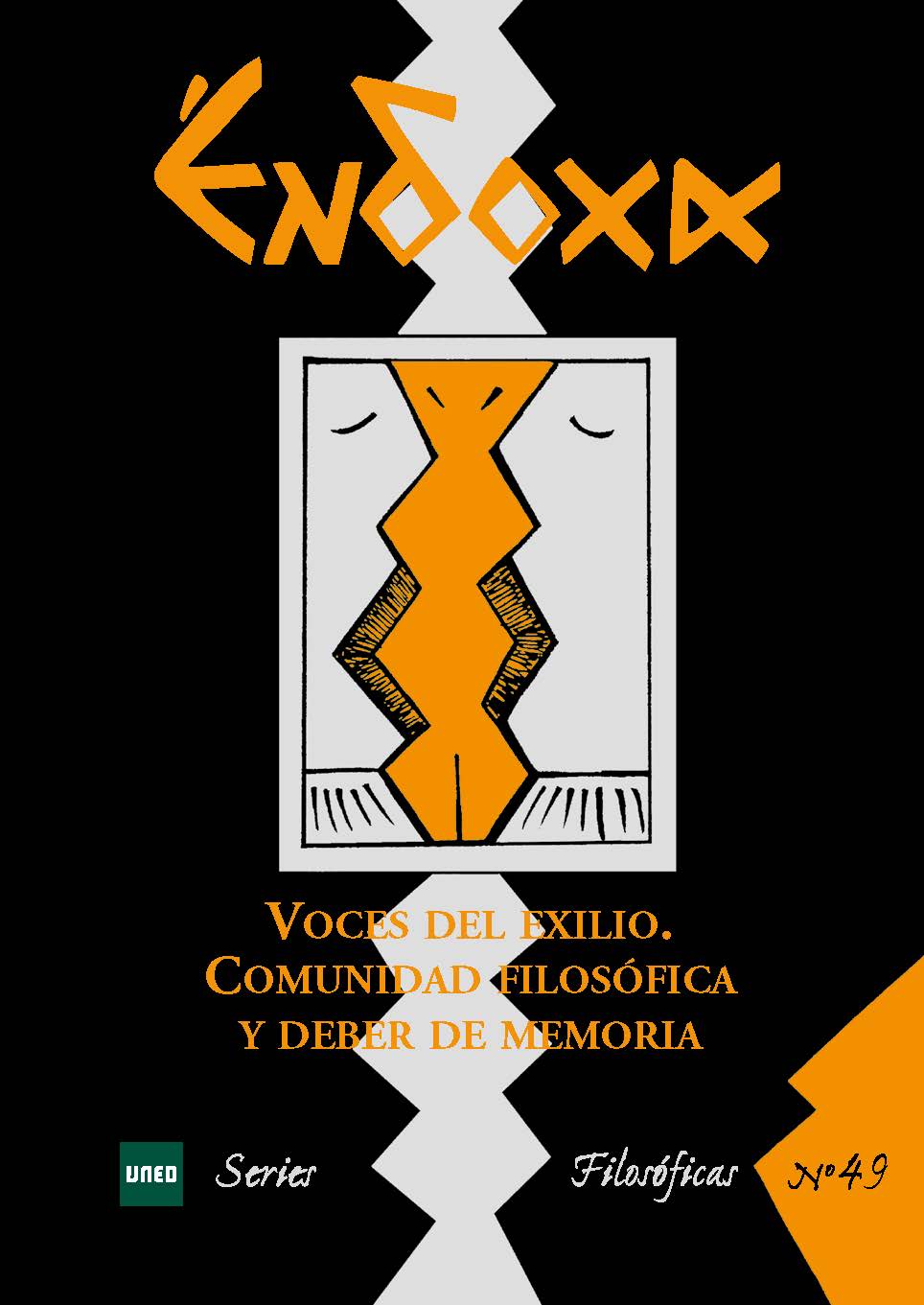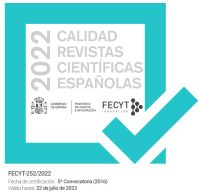Exile and Horror in the Works of María Zambrano and Adriana Cavarero
Autobiography, 'Gedankenexperiment', and Concept of Limit
DOI:
https://doi.org/10.5944/endoxa.49.2022.33326Keywords:
exile, state, Antigone, bio-politics, ethicsAbstract
Exile is an autobiographic experience, as well as a theme of philosophical
reflection in the works of María Zambrano. In this article I propose an interpretation of the figures of exile and the subject suffering exile that takes them as a Gedankenexperiment
– that is an hypothetic and imaginative reasoning turning around a concrete
example – that allows Zambrano to develop a philosophical argument within the frame of figurative language. The interpretation allows me to follow the circulation of the figures and the influence they had in the development of Italian bio-political philosophy, most prominently in the works of Adriana Cavarero. Further, I argue that the figures of the exile, and the subject suffering exile, are understood philosophically as a limit
interior to the state in the works of both authors, and that this idea carries with it ethical consequences. I conclude that the method of writing figuratively is a conscious choice
of style that aims at making the ethical stance found in the philosophical elaboration effective on the level of the text.
Downloads
References
Agamben, G. & Sofri, A. (1985). “Adriano Sofri intervista Giorgio Agamben”. En
Reporter, Noviembre 9-10, 32-33.
Andrés Castellanos, D. & Mora García J.L. (eds.) (2011). De ley y de corazón.
Historia epistolar de una amistad. Madrid: Caja Segovia, Universidad Autónoma de
Madrid.
Arendt, H. (1950). The Origins of Totalitarianism. New York: Harcourt.
Bataille, G. (1955). “Hegel, la mort et le sacrifice”. En Deucalion, vol. 5, 21-43.
Bergamín, J. & Dennis, N. (2004). Dolor y claridad de España, cartas a María Zambrano.
Sevilla: Editorial Renacimiento.
Bundgård, A. (2000). Más allá de la filosofía – sobre el pensamiento filosófico-místico de
María Zambrano. Madrid: Trotta.
Cavarero, A. (2002). Stately bodies, literature, philosophy and the question of gender. Ann
Arbor: University of Michigan Press.
— (2005). For more than one voice, towards a philosophy of vocal expression. Stanford:
Stanford University Press.
— (2011). Horrorism, naming contemporary violence. New York: Columbia University
Press.
— (2013). “Recritude: Reflections on Postural Ontology”. En Journal of Speculative
Philosophy, vol. 27:3, 220-235.
Enquist Källgren, K. (2017). “Exile as context. A broader perspective on the circulation
of knowledge”. En Lychnos 2017/1.
Enquist Källgren, K., Fenoy Gutiérrez, S. & Moreno Sanz, J. (2019). “Presentación,
la última tabla de un naufragio: el país de los vivientes”. En Zambrano, M.
Obras Completas, vol. IV:2, ed. Moreno Sanz, J. Barcelona: Galaxia Gutenberg,
-379.
Hegel, G.W. F. (1907). Phänomenologie des Geistes. Leipzig: Verlag der Dürr’schen
Buchhandlung.
Horowitz, T. & Massey, G.J. (1991). Thought experiments in science and philosophy.
Savage: Rowman & Littlefield.
Kaufmann, W. (1968). Nietzsche, Philosopher, Psychologist, Antichrist. New Jersey: Princeton
University Press.
Kelly, M. (1983). “The post-war Hegel revival in France: a bibliographical essay”. En
Journal of European Studies, vol. xiii, 199-216.
Maillard, C. (1992). La creación por la metáfora – introducción a la razón poética. Barcelona:
Anthropos.
Maillard, M. L. (1997). María Zambrano. La literatura como conocimiento y participación.
Lleida: Universitat de Lleida.
Morey, M. (2018). Vidas de Nietzsche. Madrid: Alianza.
Nietzsche, F. (1887). Morgenröthe. Gedanken über die moralischen Vorurtheile. Leipzig:
E.W. Fritzsch.
Revilla, C. (1998). Claves de la razón poética. Madrid: Trotta.
Secord, J. (2004). “Knowledge in Transit”. En Isis 95/4, 654-672.
Szabo Gendler, T. (2010). Intuition, imagination and philosophical methodology.
Oxford: Oxford University Press.
Trapanese, E. (2018). “Lecturas de Antígona o de la ciudad inclinada”. En Las Torres
de Lucca, vol. 7:12 (Dossier “El exilio como figura política”, editado por Antolín
Sánchez Cuervo), 103-124.
Zambrano, M. (1934). “Por qué se escribe”. En Revista de Occidente, XLIV.
— (2004a). “Letter to Rafael Dieste, November 7, 1944”. En La Razón en la sombra –
antología crítica, Moreno Sanz, J. (ed.). Madrid: Siruela, 114-125.
— (2009). Amo mi exilio. Las palabras del regreso, ed. Mercedes Gómez Blesa. Madrid:
Cátedra, 65-67.
— (2011a). La tumba de Antígona. Obras Completas, vol. III, ed. Moreno Sanz, Jesús.
Barcelona: Galaxia Gutenberg.
— (2011b). Persona y democracia. Obras completas, vol. III, ed. Moreno Sanz, Jesús.
Barcelona: Galaxia Gutenberg.
— (2011c). El hombre y lo divino. Obras completas, vol. III, ed. Moreno Sanz, Jesús.
Barcelona: Galaxia Gutenberg.
— (2018a). De la aurora. Obras completas, vol. IV:1, ed. Moreno Sanz, Jesús. Barcelona:
Galaxia Gutenberg.
— (2018b). Claros del Bosque. Obras completas, vol. IV:1, ed. Moreno Sanz, Jesús. Barcelona:
Galaxia Gutenberg.
— (2019a). Notas de un método. Obras completas, vol. IV:2, ed. Moreno Sanz, Jesús.
Barcelona: Galaxia Gutenberg.
— (2019b). Los Bienaventurados. Obras completas, vol. IV:2, ed. Moreno Sanz, Jesús.
Barcelona: Galaxia Gutenberg.
Published
Versions
- 2022-06-27 (2)
- 2022-06-27 (1)
How to Cite
Issue
Section
License

This work is licensed under a Creative Commons Attribution-NonCommercial-NoDerivatives 4.0 International License.








